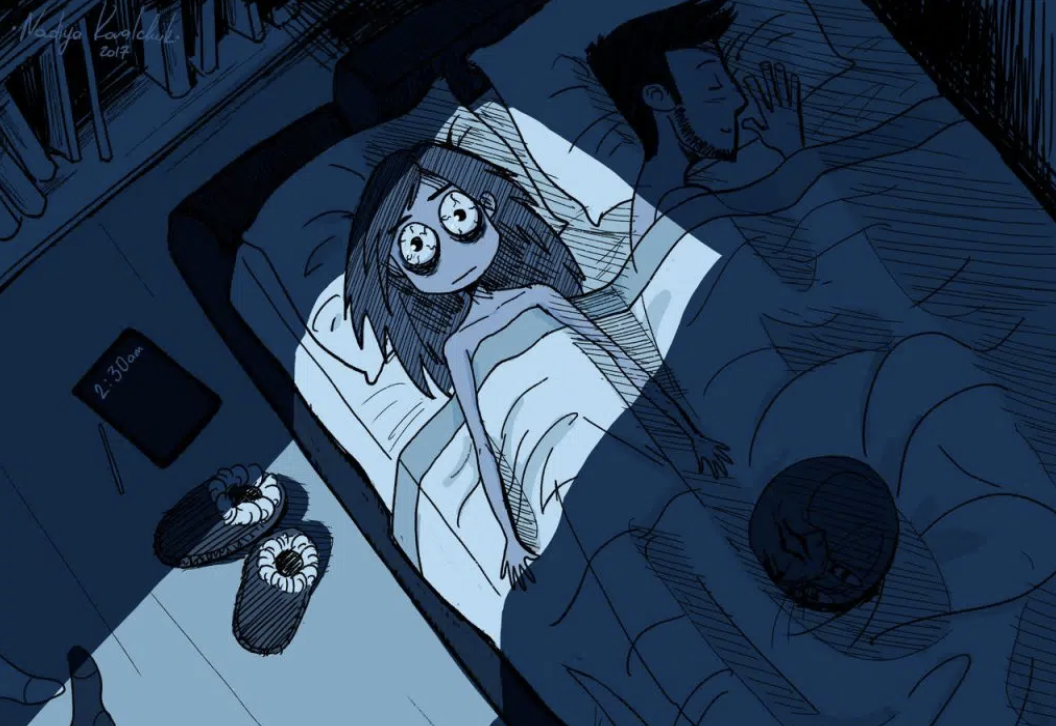By Blaise Dupont, Year 12
Insomnia, from its Latin root ‘insomnis’, meaning sleepless, is described as a state in which an individual is incapable of falling asleep. In some cases, it can be a chronic condition, perhaps even lifelong, and can be dangerously fatal for many. A well-known sleep disorder, it is often characterised by disturbed sleeping patterns and perpetuating fatigue. Individuals with insomnia often experience co-existing mental illnesses such as anxiety and depression as well as others among the vast range of mental disorders impacting chemical balance in the brain.
In its most primitive definition, insomnia occurs when there is a lack of melatonin in the brain. Melatonin is a hormone produced by the pituitary gland in the brain that allows the body to relax and prepare for sleep. There are many conditions that can increase the likelihood of developing insomnia, including:
- Environmental factors
- Environmental factors can include exterior noise that is pestering the individual. The temperature of the room in which the individual sleeps in, in either extremes, can also cause great discomfort. Jetlag is also a common experience that can interfere with sleeping patterns and cause moderate insomnia.
- Drugs – Stimulants
- Defined by their ability to alter the functions of the brain, several types of drugs can be the cause of insomnia. Evidently, stimulants including caffeine, nicotine or drugs such as ecstasy or cocaine, can result in a disruption of the brain’s chemical stability. Other substances, such as alcohol, can also cause similar disruptions.
- Health – Physical, Psychological
- Physical illness and distress also cause the body to be much more internally active and troubled. This can take an unfortunate toll on the quality of the individual’s sleep, and correspondingly, a detrimental effect on the body itself. Mental illness and stress can also generate a number of issues with sleep. Anxiety, for instance, is one of the domineering roots of insomnia. This is due to the amygdala, a region of the brain, releasing an excessive amount of the hormone adrenaline in the body, which creates tension and an obstacle force against melatonin. Stress alone can also cause short-term insomnia, however unlike anxiety, stress is much more short-lasting and much milder in severity. Along with stress, other strong emotions such as anger or excitement can also cause short-term, or primary, insomnia. A final psychological motive for insomnia is chemical imbalance. This is seen in many different disorders, including all types of bipolar disorders, many personality disorders and other neurological disorders including Autism Spectrum Disorder (ASD) and Attention Deficit Hyperactivity Disorder (ADHD). These disorders can sometimes cause hypomanic/manic episodes in which the brain is too overloaded with stimulating chemicals to rest properly. This is particularly the case with mood disorders and Borderline Personality Disorder.
Insomnia is a generally a disorder that is mild and non-lethal. It tends to be the consequence of external factors. However, there are rare cases of Fatal Insomnia, which is an extremely rare neurodegenerative disorder resulting from genetic factors, or in even rarer cases, spontaneous developments. Fatal Insomnia begins as a mild type of insomnia, and quickly degenerates into complete insomnia, where an individual is simply unable to sleep.
Fatal Insomnia is also known as Prion disease and describes an accumulation of prions in the thalamus of the brain, the region that regulates sleep. Prions are misfolded proteins that can cause cellular damage, and even death. Its accumulation in the thalamus may cause that region of the brain to be severely wounded, and the affected individual will not be able to rest and their bodies and minds will endure the consequences. Eventually, the individual’s both physical and psychological state will have deteriorated so significantly that they will unfortunately pass away.
This side of insomnia is much less frequently discussed, as it is a perturbing matter. However, as with all other health concerns, insomnia is still a disorder to be wary of. It is a great reminder of how valuable sleep is for the body and the mind. It is essential to get the rest necessary for one’s well-being, and get the recommended amount of sleep as often as possible in order to avoid extensive struggles.



